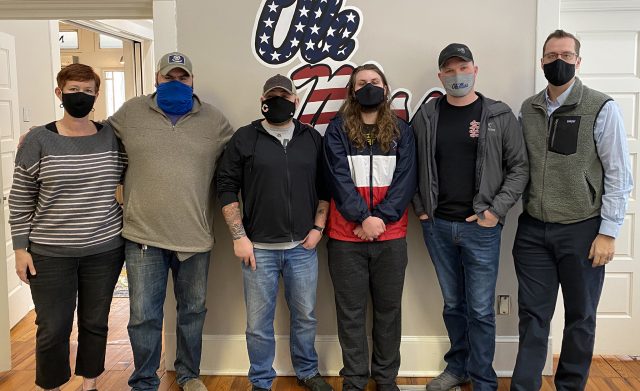
Molly Pasco-Pranger (left), professor and chair of the Department of Classics, and Andrew Newby (right), assistant director of veteran and military services, co-taught a new course on Humanities and the Experience of War this spring at the university. Participants include (from left) Beau Roddy, Julian Spain-Ledezma, Jake Riffe and Nolan Oglesby. Submitted photo
OXFORD, Miss – Is war an aberration or an integral part of the human experience?
That question lies at the center of LIBA 305: Humanities and the Experience of War, a new class that debuted this spring at the University of Mississippi.
Molly Pasco-Pranger, professor and chair of the UM Department of Classics, and Andrew Newby, assistant director of veteran and military services, co-taught the course this spring.
“We wanted to examine the different problems that arise upon the homecoming and reintegration of soldiers into society, examining the perspectives of both soldiers and civilians,” Pasco-Pranger said.
Newby, a Marine veteran, and Pasco-Pranger began collaborating on a joint vision to unify student veterans and nonveterans on the Ole Miss campus. Their class is the first to put the imprimatur of the university’s Office of Veteran and Military Services on a course in the liberal arts curriculum.
The key texts for the course are nearly three millennia apart but similarly themed: Homer’s ancient Greek epic poem “The Odyssey” and a graphic novel, “The White Donkey,” by Maximilian Uriarte, an American artist and writer who served in the U.S. Marine Corps.
While “The Odyssey” tells the story of Greek hero Odysseus and his 10-year struggle to return to his home kingdom following the Trojan War, “The White Donkey” portrays the experience of a Marine in the Iraq War and the frustrations of returning home to civilian life.
“We are looking at the ever-changing, never-changing aspects of war and conflict,” Newby said. “To explore how a text from 700 B.C., when “The Odyssey” was written, describes the same things as when a veteran in 2020 is trying to come home but doesn’t come home all the way.”
Although COVID-19 curtailed the community outreach initially planned for the course, the class lived up to expectations, Pasco-Pranger said.
“Our students have been brave and generous in sharing their experiences and listening to one another and to the voices of authors ancient and contemporary,” she said. “We’ve had frank and powerful conversations about the ways war shapes and transforms human lives, both for veterans and for their families.
“My wish for this course is that it creates a relationship between the students, the community and the Office of Veteran and Military Services, so that these conversations around the experience of war can continue to take place.”